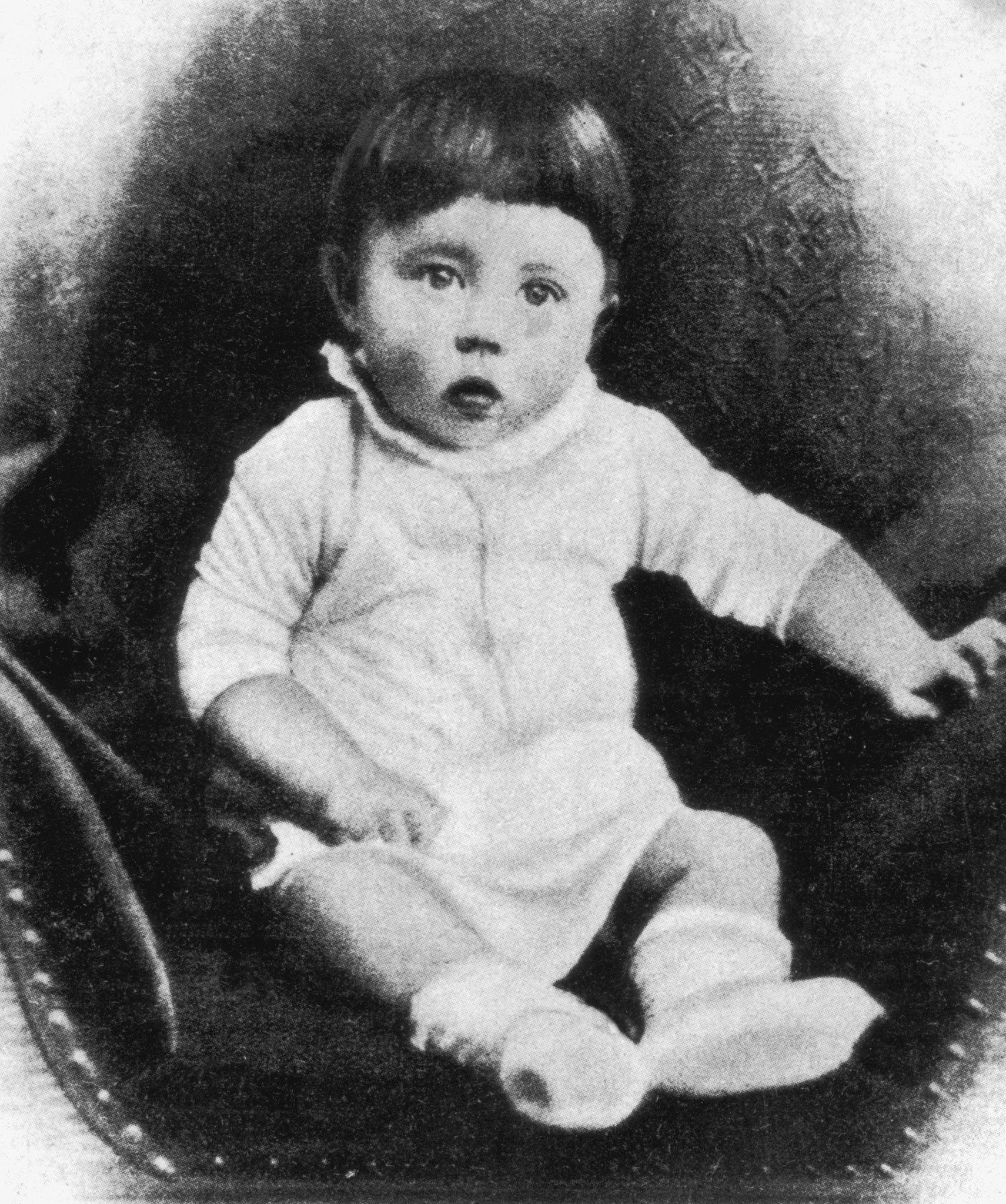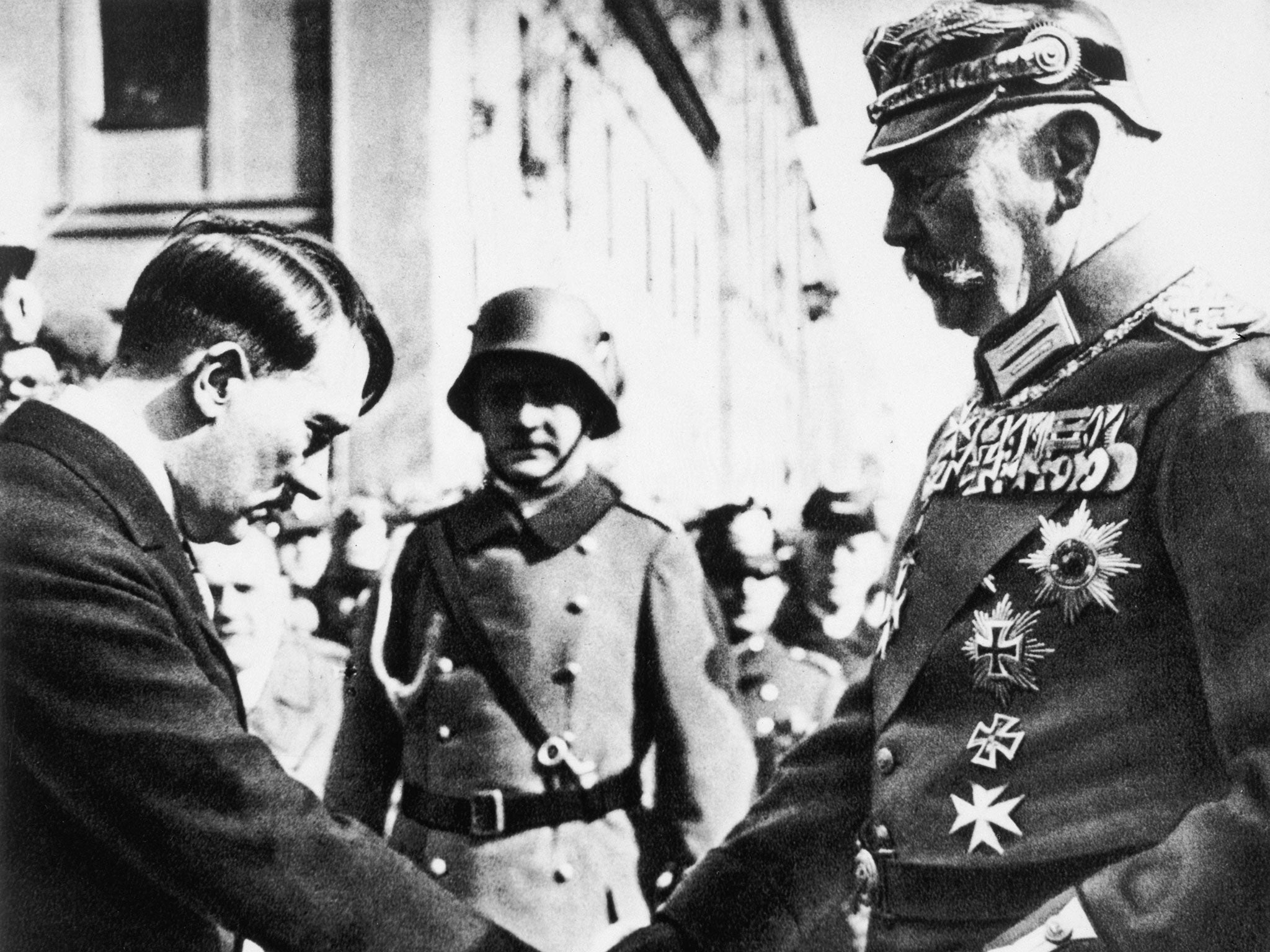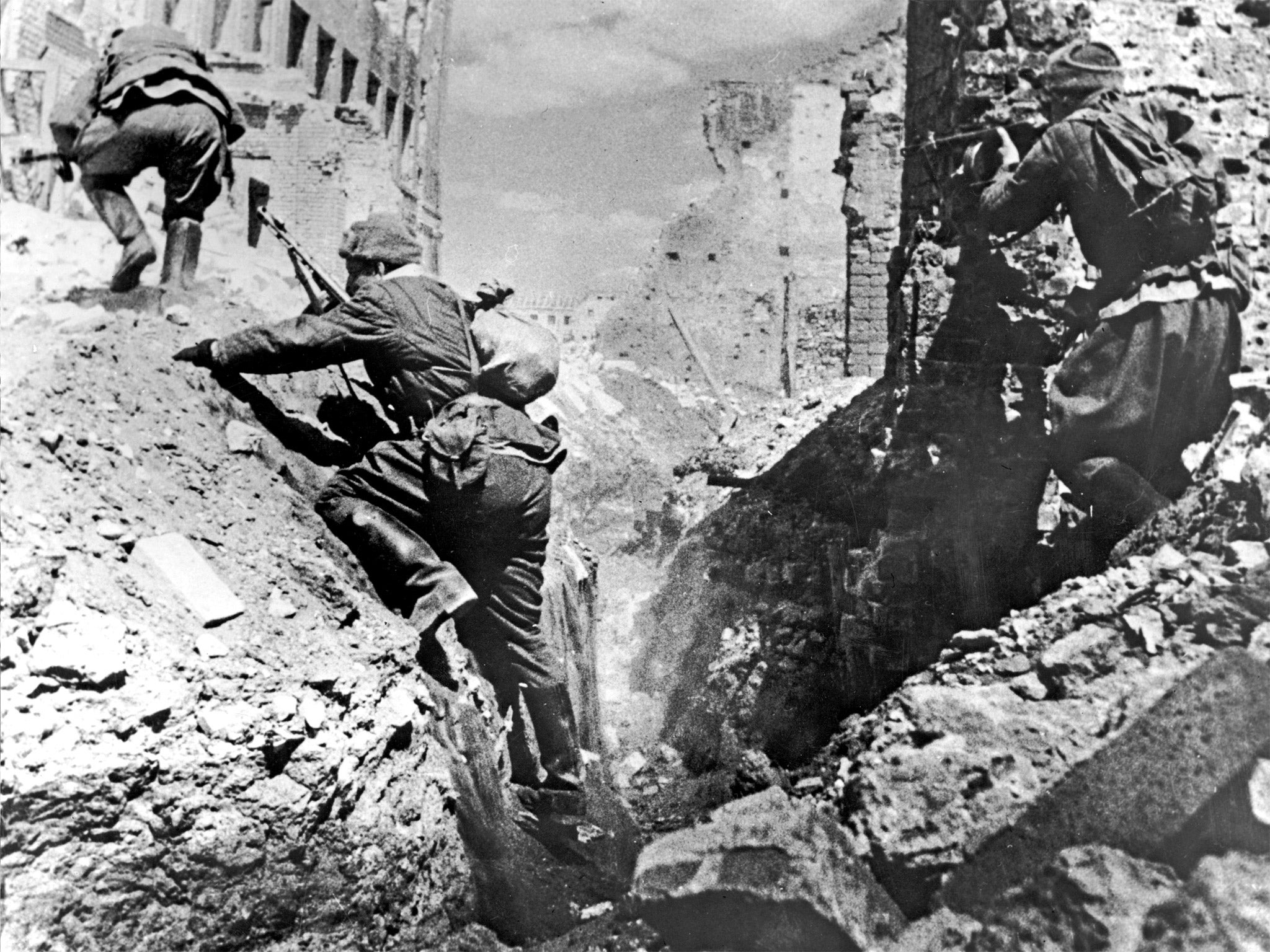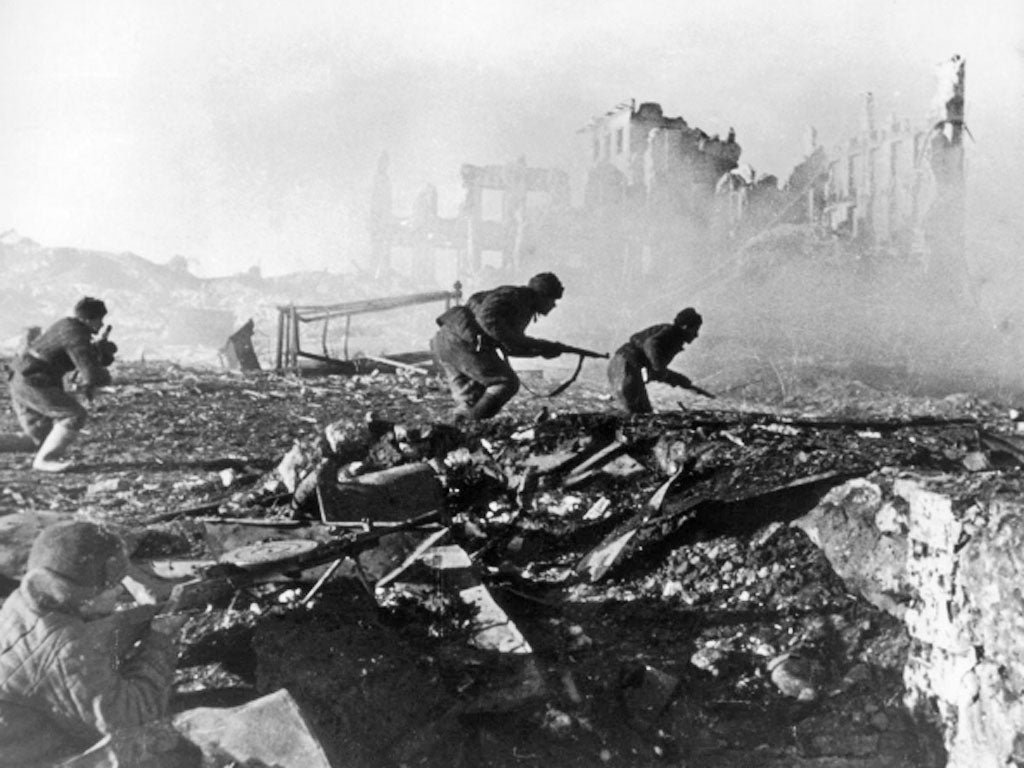How the Nazi note which helped end WWII in Europe was nearly forgotten in a US safe
The itinerant but now infamous telegram sold at auction for $55,000 - not bad for a scrap of paper plucked at random in the pitch dark

Your support helps us to tell the story
From reproductive rights to climate change to Big Tech, The Independent is on the ground when the story is developing. Whether it's investigating the financials of Elon Musk's pro-Trump PAC or producing our latest documentary, 'The A Word', which shines a light on the American women fighting for reproductive rights, we know how important it is to parse out the facts from the messaging.
At such a critical moment in US history, we need reporters on the ground. Your donation allows us to keep sending journalists to speak to both sides of the story.
The Independent is trusted by Americans across the entire political spectrum. And unlike many other quality news outlets, we choose not to lock Americans out of our reporting and analysis with paywalls. We believe quality journalism should be available to everyone, paid for by those who can afford it.
Your support makes all the difference.It is one of the most crucial documents from the most pivotal moment in the most terrible war.
A treasonous telegram from No. 2 Nazi Hermann Goering to none other than the fuhrer himself.
A message that, along with the advancing Allied troops, helped drive Adolf Hitler to swallow cyanide and shoot himself inside his underground Berlin bunker.
Despite its influence on World War II, however, the memorandum ended up inside a South Carolina safe, nearly forgotten for more than a decade until a college student made it his senior thesis.
On 7 July, the itinerant but now infamous telegram sold at auction for $55,000.
Not bad for a scrap of paper plucked at random in the pitch dark.

This is the story of how a Nazi note changed the course of history, only to slip through the cracks thanks to an American soldier’s ignorance of German.
It was April 23, 1945, almost a year after American troops landed at Normandy. Americans had crossed the Rhine in early March, but it was Soviet troops that now had Hitler and many of his top advisers surrounded.
But not Hermann Goering. An ace fighter pilot in the first World War, Goering had helped Hitler take power in 1933 and stayed at his side as the Third Reich hungrily expanded. So close was he to Hitler that in June of 1941, the fuhrer issued a secret decree stating that should he be captured or killed, Goering would take over.
As the war dragged on, however, Hitler became suspicious of his No. 2. And as the Soviets advanced to within two blocks of Hitler’s bunker, Goering was nowhere to be found. He was holed up nearly 500 miles south in the Bavarian Alps.

From a Nazi base in the mountainous town of Berchtesgaden, Goering sent a telegram to Hitler shortly after midnight:
My Fuhrer:
General Koller today gave me a briefing on the basis of communications given to him by Colonel General Jodl and General Christian, according to which you had referred certain decisions to me and emphasized that I, in case negotiations would become necessary, would be in an easier position than you in Berlin. These views were so surprising and serious to me that I felt obligated to assume, in case by 2200 o’clock no answer is forthcoming, that you have lost your freedom of action. I shall then view the conditions of your decree as fulfilled and take action for the well being of Nation and Fatherland. You know what I feel for you in these most difficult hours of my life and I cannot express this in words. God protect you and allow you despite everything to come here as soon as possible.
Your faithful Hermann Goering
According to an autobiography by Albert Speer, Hitler’s chief architect turned Minister of Armaments and War Production, those close to the fuhrer used the telegram to pollute Hitler’s already fragile mind against Goering:
". . . there was a flurry of excitement in the vestibule. A telegram had arrived from Goering, which Bormann hastily brought to Hitler. I trailed informally along after him, chiefly out of curiosity. In the telegram Goering merely asked Hitler whether, in keeping with the decree on succession, he should assume the leadership of the entire Reich if Hitler remained in Fortress Berlin. But Bormann claimed that Goering had launched a coup d’etat; perhaps this was Bormann’s last effort to induce Hitler to fly to Berchtesgaden and take control there. At first, Hitler responded to this news with the same apathy he had shown all day long. But Bormann’s theory was given fresh support when another radio message from Goering arrived. I pocketed a copy which in the general confusion lay unnoticed in the bunker. It read:"
To Reich Minister von Ribbentrop
I have asked the Fuehrer to provide me with instructions by 10 p.m. April 23. If by this time it is apparent that the Fuehrer has been deprived of his freedom of action to conduct the affairs of the Reich, his decree of June 29, 1941, becomes effective, according to which I am heir to all his offices as his deputy. [If] by 12 midnight April 23, 1945, you receive no other word either from the Fuehrer directly or from me, you are to come to me at once by air.
(Signed) Goering, Reich Marshal
Here was fresh material for Bormann. “Goering is engaged in treason!” he exclaimed excitedly. “He’s already sending telegrams to members of the government and announcing that on the basis of his powers he will assume your office at twelve o’clock tonight, mein Fuhrer.”
Although Hitler remained calm when the first telegram arrived, Bormann now won his game. Hitler immediately stripped Goering of his rights of succession – Bormann himself drafted the radio message – and accused him of treason to Hitler and betrayal of National Socialism. The message to Goering went on to say that Hitler would exempt him from further punishment if the Reich Marshal would promptly resign all his offices for reasons of health.
Bormann had at last managed to rouse Hitler from his lethargy. An outburst of wild fury followed in which feelings of bitterness, helplessness, self-pity, and despair mingled. With flushed face and staring eyes, Hitler ranted as if he had forgotten the presence of his entourage:
“I’ve known it all along. I know that Goering is lazy. He let the air force go to pot. He was corrupt. His example made corruption possible in our state. Besides he’s been a drug addict for years. I’ve known it all along.”

According to Speer’s biography (written while serving 20 years in prison following his trial at Nuremberg), Hitler’s fury instantly dissolved into depression.
“Well, all right,” he said, according to Speer. “Let Goering negotiate the surrender. If the war is lost anyhow, it doesn’t matter who does it.”
“Hitler had reached the end of his strength,” Speer wrote. “He dropped back into the weary tone that had been characteristic of him earlier that day. For years he had overtaxed himself; for years, mustering that immoderate will of his, he had thrust away from himself and others the growing certainty of this end. Now he no longer had the energy to conceal his condition. He was giving up.”
A week later, Hitler and his companion, Eva Braun, killed themselves.
Goering was put under house arrest but freed by the Luftwaffe, the Nazi air force. He then made his way west in the hope of surrendering to the Americans instead of the Soviets. He was captured by the U.S. Army on May 6 and imprisoned in Luxembourg and later Nuremberg, where he was among the top Nazi officials to be put on trial. He was sentenced to hang but killed himself hours beforehand by swallowing a cyanide capsule.
Shortly after Hitler’s suicide, his Berlin bunker was overrun by Soviet soldiers.

More than a month later, American troops were wading through the crumbling, water-logged Nazi hideout when U.S. Army Capt. Benjamin M. Bradin entered the bunker. The place was pitch black and damaged by shelling, looting and flooding.
“Standing in the wet darkness of this wrecked bunker in Berlin, Captain [Benjamin] Bradin of the U.S. Army snapped his cigarette lighter shut, scooped an untidy armful of souvenirs off somebody’s desk, and groped his way back up the dark angular staircase to the daylight,” wrote controversial historian David Irving in a 2012 biography of Goering. “In the warm sun the haul seemed disappointing: a brass desk lamp, cream-colored paper with some handwriting on it, blank letterheads, flimsy telegrams typed on Germany Navy signals forms, and a letter dictated to ‘my dear Heinrich.’”
At war’s end, Bradin brought the documents home with him to South Carolina. Apparently unaware of their contents, he put them in his local bank vault, where they stayed until 1958.
That’s when Bradin’s son James — a future Army colonel — took the papers to his history professor at The Citadel, the military college, in Charleston.
Dr. Robert Rieke, a German-speaker, examined the telegram and immediately realized its importance. He urged James Bradin to write his senior thesis on the documents.
Bradin later gave Rieke the telegram, according to Alexander Historical Auctions. But his wife Jervy says he didn’t realize he was handing over such a valuable piece of history.
“He handed it in as part of his senior thesis,” she said over the phone from their retirement home in Tampa. “He really did not realize that he had given it away, I don’t think.”
On 7 July, the Maryland-based auction house put the telegram up for sale. It was expected to sell for between $15,000 and 20,000 but sold for $54,675 to an unnamed North American buyer, according to German wire service DW.
The Bradin family won’t see a cent, however.
“They called to say they were going to sell it at auction,” Jervy Bradin said. “They bypassed him with the money.”
Copyright: Washington Post
Join our commenting forum
Join thought-provoking conversations, follow other Independent readers and see their replies
Comments